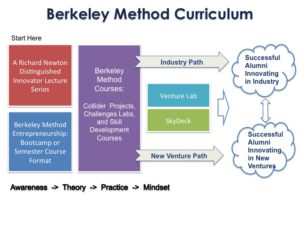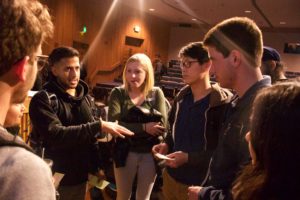
Introduction to the Series:
The third week of the Newton Lecture Series brought an introduction to the goals of the lecture series itself. Ikhlaq Sidhu, founding director of the Sutardja Center for Entrepreneurship and Technology, took time out of his busy schedule to meet with students in the series and discuss the SCET’s long-standing investment in entrepreneurs, industry, and what he explained as the “Berkeley Method.”
Since the Newton Lecture Series began with two phenomenal speakers, Sidhu had to postpone his introduction to the course. A packed room of students listened as Sidhu shed light on the Lecture Series and its history as part of UC Berkeley. Sidhu stated that from the wealth of courses offered by the SCET—undergrad, graduate, and industry—the Newton Lecture Series is one of the most popular each semester.
Sidhu explained that this course is an exemplary collective of the SCET’s approach to entrepreneurship and innovation, which he characterized as having two component parts. The first part, comprised of Mindset and Behavior, affect how individuals see the world and react to their circumstances. The second, Team Formation, centers around the mission to help like-minded students convene.
Ikhlaq’s Background and Involvement:
Ikhlaq Sidhu is a key figure in Berkeley’s Sutardja Center, the Fung Institute, and the Engineering Leadership Professional Program (ELPP). Sidhu received the Industrial Engineering and Operations Research (IEOR) Emerging Area Professor award, and continues to be an active professor—all in addition to his research about strategic data analytics, learning models, and systems and stochastic models.
The Berkeley Method:
Sidhu’s studies and investment in the Center made him an ideal figure to discuss the Berkeley Method. This learning method is different from other courses, according to Sidhu, because it cannot be taught prescriptively; there are no formulas, recipes, or tests for retention. Instead, it relies on Inductive Reasoning, which depends on the notion that individuals can find answers in their environment by observing cause and effect and finding patterns.
The Berkeley Method is heavily used and applied in the Newton Lecture Series. Through this course, Professor Sidhu shared his hopes that students would meet and learn from a wide range of people. Sidhu stated that this course has been successful for the past decade because it emphasized a holistic journey instead of a fixed path. In terms of available resources and
information, Sidhu explained that those individuals we interpret as having social barriers with also hold the most valuable  and different information.
and different information.
How This Connects to the Course:
After this introduction, Travis, the course’s GSI, discussed the reasoning behind the project this year’s students are assigned. Whereas in the past, students interacted very sparsely with one another, the course’s final project allows students to create relationships with their peers and work towards a relevant and exciting project—a feature of the course that future students can now look forward to!
